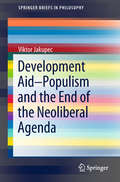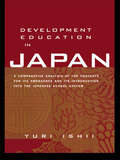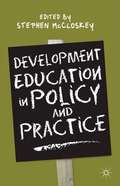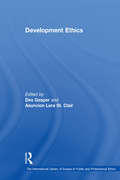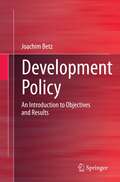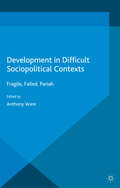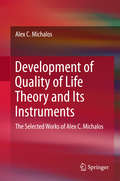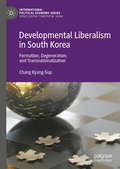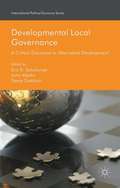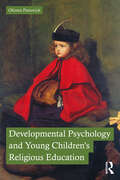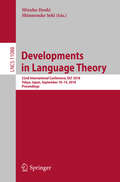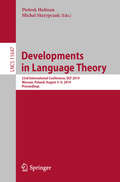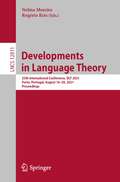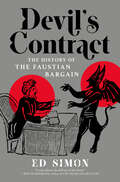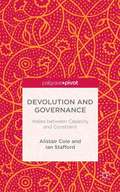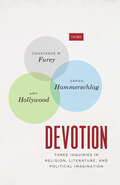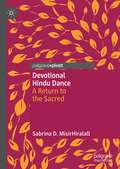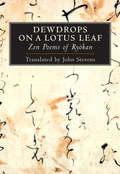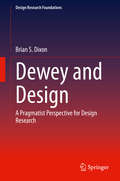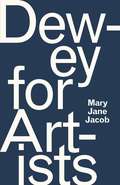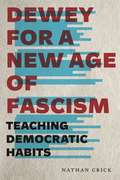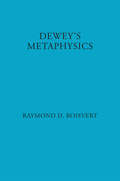- Table View
- List View
Development Aid—Populism and the End of the Neoliberal Agenda (SpringerBriefs in Philosophy)
by Viktor JakupecThis volume examines the impact of the Trump presidency on development aid. It starts out by describing the rise of national populism, the political landscape and the reasons for rejection of the political establishment, both under Trump and internationally. Next, it gives a historical-political overview of development aid in the post WW-II era and discusses the dominant Washington Consensus doctrine and its failure. It then provides a critique of the Official Development Assistance (ODA) discourse and reviews the political economy of ODA, the discourse, and the conditionalities that are barriers to socio-economic development. The final chapters explore the question of Trumponomics as an alternative to the global neoliberal ODA, and the potential impact of Trumponomics' on ODA. The book concludes with thoughts on the potential future directions for ODA within the 'ideals' of Trumponomics and national populism.
Development Education in Japan: A Comparative Analysis of the Contexts for Its Emergence, and Its Introduction into the Japanese School System (Reference Books in International Education)
by Yuri IshiiThis book aims to provide an explanation for the slow introduction of Development Education in Japan.
Development Education in Policy and Practice
by Stephen MccloskeyDevelopment education is a radical form of learning that addresses the structural causes of poverty, inequality and injustice in the global North and South. It equips learners with the skills, values, attitudes and understanding needed to take effective action toward social change. This comprehensive collection rigorously debates development education practice in the formal and informal education sectors and the policy environment in which it is delivered. It affirmatively points to the transformative power of education to engage learners in actions that tackle the underlying factors that sustain poverty. With neoliberalism in crisis and poverty enveloping the global North, the book argues that development education has an important role to play in debating alternative paradigms of development informed by social need and sustainability. The global cast of authors with extensive experience of the sector provide an indispensable guide to a burgeoning area of education.
Development Ethics (The International Library of Essays in Public and Professional Ethics)
by Asuncion Lera ClairThe traditional definition of development ethics considers the 'ethical and value questions posed by development theory, planning and practice' (Goulet 1977: 5). The field parallels the traditional question of ethics 'How ought one to live as an individual?' by asking in addition 'How ought a society exist and move into the future?' This interdisciplinary field is well represented by a substantial collection of previously-published articles and papers. The volume illustrates a wide range of academic and practitioner writings on the theories and concepts of development ethics as well as ethical development policy and practice.
Development Policy: An Introduction to Objectives and Results
by Joachim BetzDeveloping countries have made rapid but highly varied progress since the 1990s. So much so that the boundaries to the traditional industrialized countries have become partially blurred. On the other hand, there are a number of mostly fragile states that have not succeeded in doing so, or have only rudimentarily succeeded. Talk of one "Third World" and common development problems thus explains little. Instead, development has become a requirement for all states, which this textbook breaks down and assesses according to key development goals.This book is a translation of the original German 1st edition Entwicklungspolitik by Joachim Betz, published by Springer Fachmedien Wiesbaden GmbH, part of Springer Nature in 2021. The translation was done with the help of artificial intelligence (machine translation by the service DeepL.com). A subsequent human revision was done primarily in terms of content, so that the book will read stylistically differently from a conventional translation. Springer Nature works continuously to further the development of tools for the production of books and on the related technologies to support the authors.
Development in Difficult Sociopolitical Contexts
by Anthony WareThis edited volume explores development in the so-called 'fragile', 'failed' and 'pariah' states. It examines the literature on both fragile states and their development, and offers eleven case studies on countries ranking in the 'very high alert' and 'very high warning' categories in the Fund for Peace Failed States Index.
Development of Quality of Life Theory and Its Instruments
by Alex C. MichalosThe focus of this volume is on the further development of the Quality of Life Theory and the means to measure the concept. The volume summarizes Michalos' fundamental assumptions about the nature of quality of life or human well-being and explains in detail the two variable theory of the quality of life. It gives an update of the journal Social Indicators Research after forty years, an explanation of the role of community indicators in connecting communities, and a critical review of the much publicized Stiglitz, Sen and Fitoussi report. It deals with the multiple discrepancies theory (MDT), the empirical theory designed to provide the foundation of the pragmatic theory of value. Other concepts discussed in this volume are the stability, sensitivity, and other different features of measures of domain and life satisfaction and happiness, measures of arts-related activities and beliefs, measures of knowledge, attitudes and behaviour concerning sustainable development, and the role of quality of life in sustainable development research. The volume concludes with discussions on connections between social indicators and communities, aspects of community quality of life in Prince George, British Columbia and Jasper, Alberta, and British Columbians' expectations and attitudes going into the third millennium.
Developmental Liberalism in South Korea: Formation, Degeneration, and Transnationalization (International Political Economy Series)
by Chang Kyung-SupThis book characterizes South Korea’s pre-neoliberal regime of social governance as developmental liberalism and analyzes the turbulent processes and complex outcomes of its neoliberal degeneration since the mid-1990s. Instead of repeating the politically charged critical view on South Korea’s failure in socially inclusionary and sustainable development, the author closely examines the systemic interfaces of the economic, political, and social constituents of its developmental transformation. South Korea has turned and remained developmentally liberal, rather than liberally liberal (like the United States), in its economic and sociopolitical configuration of social security, labor protection, population, education, and so forth. Initially conceived in the late 1980s, ironically along its democratic restoration, and radically accelerated during the national financial crisis in the late 1990s, South Korea’s neoliberal transition has become incomparably volatile and destructive, due crucially to its various distortive effects on the country’s developmental liberal order.
Developmental Local Governance: A Critical Discourse In 'alternative Development' (International Political Economy Series)
by John Martin Sonia Gatchair Eris SchoburghThe primary purpose of this edited collection is to evaluate critically the relationship between local government and national economic development. It focuses on how the relationship between local government and development is structured, and the specific institutional arrangements at national and subnational levels that might facilitate local government's assumption of the role of development agent. In light of the contradictory outcomes of development and implied experimentation with new modalities, post-development discourse provides a useful explanatory framework for the book. Schoburgh, Martin and Gatchair's central argument is that the pursuit of national developmental goals is given a sustainable foundation when development planning and strategies take into account elements that have the potential to determine the rate of social transformation. Their emphasis on localism establishes a clear link between local government and local economic development in the context of developing countries.
Developmental Psychology and Young Children’s Religious Education
by Olivera PetrovichDevelopmental Psychology and Young Children’s Religious Education sets out to identify the conceptual pre-requisites for young children’s religious education learning and clearly highlights the challenges that children and their teachers encounter in the RE educational process. Based on a study with 431 children aged 5 to 7 years from different schools, faith and non-faith, and 47 teachers from the same schools as the children, this book offers an insightful look into younger children’s religious education, providing statistical evidence to dismantle the belief that young children lack the ability to conceptualise God in abstract terms. The information obtained from these children and their teachers reveals a major discrepancy between the teachers’ perceptions of young children’s conceptual abilities for RE learning, on the one hand, and children’s actual abilities revealed in their responses throughout the study, on the other. Based on the evidence described in the volume, Petrovich argues that teacher-training courses for primary RE need to be designed to include a substantial component of contemporary developmental research that is of direct relevance to children’s conceptual abilities and understanding of abstract concepts. Developmental Psychology and Young Children’s Religious Education is essential reading for students and researchers in developmental psychology, religious education, teacher education, education studies and cultural anthropology.
Developments in Language Theory: 22nd International Conference, DLT 2018, Tokyo, Japan, September 10-14, 2018, Proceedings (Lecture Notes in Computer Science #11088)
by Mizuho Hoshi Shinnosuke SekiThis book constitutes the proceedings of the 22nd International Conference on Developments in Language Theory, DLT 2018, held in Tokyo, Japan, in September 2018. The 39 full papers presented in this volume were carefully reviewed and selected from 84 submissions. The papers cover the following topics and areas: combinatorial and algebraic properties of words and languages; grammars, acceptors and transducers for strings, trees, graphics, arrays; algebraic theories for automata and languages; codes; efficient text algorithms; symbolic dynamics; decision problems; relationships to complexity theory and logic; picture description and analysis, polyominoes and bidimensional patterns; cryptography; concurrency; celluar automata; bio-inspired computing; quantum computing.
Developments in Language Theory: 23rd International Conference, DLT 2019, Warsaw, Poland, August 5–9, 2019, Proceedings (Lecture Notes in Computer Science #11647)
by Michał Skrzypczak Piotrek HofmanThis book constitutes the proceedings of the 23rd International Conference on Developments in Language Theory, DLT 2019, held in Warsaw, Poland, in August 2019. The 20 full papers presented together with three invited talks were carefully reviewed and selected from 30 submissions. The papers cover the following topics and areas: combinatorial and algebraic properties of words and languages; grammars, acceptors and transducers for strings, trees, graphics, arrays; algebraic theories for automata and languages; codes; efficient text algorithms; symbolic dynamics; decision problems; relationships to complexity theory and logic; picture description and analysis, polyominoes and bidimensional patterns; cryptography; concurrency; celluar automata; bio-inspired computing; quantum computing.
Developments in Language Theory: 25th International Conference, DLT 2021, Porto, Portugal, August 16–20, 2021, Proceedings (Lecture Notes in Computer Science #12811)
by Nelma Moreira Rogério ReisThis book constitutes the proceedings of the 25th International Conference on Developments in Language Theory, DLT 2021, which was held in Porto, Portugal, during August 16-20, 2021. The conference took place in an hybrid format with both in-person and online participation.The 27 full papers included in these proceedings were carefully reviewed and selected from 48 submissions. The DLT conference series provides a forum for presenting current developments in formal languages and automata. Its scope is very general and includes, among others, the following topics and areas: grammars, acceptors and transducers for words, trees and graphs; algebraic theories of automata; algorithmic, combinatorial, and algebraic properties of words and languages; variable length codes; symbolic dynamics; cellular automata; polyominoes and multidimensional patterns; decidability questions; image manipulation and compression; efficient text algorithms; relationships to cryptography, concurrency, complexity theory, and logic; bio-inspired computing; quantum computing. The book also includes 3 invited talks in full paper length.
Devil's Contract: The History of the Faustian Bargain
by Ed SimonA devilishly fascinating tour of the Faustian bargain through the ages, from brimstone to blues and beyond ...From ancient times to the modern world, the idea of the Faustian bargain—the exchange of one's soul in return for untold riches and power—has exerted a magnetic pull upon our collective imaginations.Scholar Ed Simon takes us on a historical tour of the Faustian bargain, from the Bible to blues, and illustrates how the impulse fto sacrifice our principles in exchange for power is present in all kinds of social ills, from colonialism to nuclear warfare, from social media to climate change to AI, and beyond. In doing so, Simon conveys just how much the Faustian bargain shows us about power and evil ... and ourselves.
Devolution and Governance: Wales between Capacity and Constraint
by Alistair Cole Ian StaffordThis book examines the development of Welsh devolution in the context of great economic and political uncertainty. Drawing on research carried out over more than a decade, it explores whether Welsh devolution has developed the capacity to resist internal and external pressures and to continue to pursue a distinctive political and policy agenda.
Devotion: Three Inquiries in Religion, Literature, and Political Imagination (TRIOS)
by Amy Hollywood Sarah Hammerschlag Constance M. FureyThree scholars of religion explore literature and the literary as sites of critical transformation. We are living in a time of radical uncertainty, faced with serious political, ecological, economic, epidemiological, and social problems. Scholars of religion Constance M. Furey, Sarah Hammerschlag, and Amy Hollywood come together in this volume with a shared conviction that what and how we read opens new ways of imagining our political futures and our lives. Each essay in this book suggests different ways to characterize the object of devotion and the stance of the devout subject before it. Furey writes about devotion in terms of vivification, energy, and artifice; Hammerschlag in terms of commentary, mimicry, and fetishism; and Hollywood in terms of anarchy, antinomianism, and atopia. They are interested in literature not as providing models for ethical, political, or religious life, but as creating the site in which the possible—and the impossible—transport the reader, enabling new forms of thought, habits of mind, and ways of life. Ranging from German theologian Martin Luther to French-Jewish philosopher Sarah Kofman to American poet Susan Howe, this volume is not just a reflection on forms of devotion and their critical and creative import but also a powerful enactment of devotion itself.
Devotion: Three Inquiries in Religion, Literature, and Political Imagination (TRIOS)
by Amy Hollywood Sarah Hammerschlag Constance M. FureyThree scholars of religion explore literature and the literary as sites of critical transformation. We are living in a time of radical uncertainty, faced with serious political, ecological, economic, epidemiological, and social problems. Scholars of religion Constance M. Furey, Sarah Hammerschlag, and Amy Hollywood come together in this volume with a shared conviction that what and how we read opens new ways of imagining our political futures and our lives. Each essay in this book suggests different ways to characterize the object of devotion and the stance of the devout subject before it. Furey writes about devotion in terms of vivification, energy, and artifice; Hammerschlag in terms of commentary, mimicry, and fetishism; and Hollywood in terms of anarchy, antinomianism, and atopia. They are interested in literature not as providing models for ethical, political, or religious life, but as creating the site in which the possible—and the impossible—transport the reader, enabling new forms of thought, habits of mind, and ways of life. Ranging from German theologian Martin Luther to French-Jewish philosopher Sarah Kofman to American poet Susan Howe, this volume is not just a reflection on forms of devotion and their critical and creative import but also a powerful enactment of devotion itself.
Devotion: Three Inquiries in Religion, Literature, and Political Imagination (TRIOS)
by Amy Hollywood Sarah Hammerschlag Constance M. FureyThree scholars of religion explore literature and the literary as sites of critical transformation. We are living in a time of radical uncertainty, faced with serious political, ecological, economic, epidemiological, and social problems. Scholars of religion Constance M. Furey, Sarah Hammerschlag, and Amy Hollywood come together in this volume with a shared conviction that what and how we read opens new ways of imagining our political futures and our lives. Each essay in this book suggests different ways to characterize the object of devotion and the stance of the devout subject before it. Furey writes about devotion in terms of vivification, energy, and artifice; Hammerschlag in terms of commentary, mimicry, and fetishism; and Hollywood in terms of anarchy, antinomianism, and atopia. They are interested in literature not as providing models for ethical, political, or religious life, but as creating the site in which the possible—and the impossible—transport the reader, enabling new forms of thought, habits of mind, and ways of life. Ranging from German theologian Martin Luther to French-Jewish philosopher Sarah Kofman to American poet Susan Howe, this volume is not just a reflection on forms of devotion and their critical and creative import but also a powerful enactment of devotion itself.
Devotional Hindu Dance: A Return to the Sacred
by Sabrina D. MisirHiralallThis book sheds light on the purpose of Hindu dance as devotional. Dr. Sabrina D. MisirHiralall explains the history of Hindu dance and how colonization caused the dance form to move from sacred to a Westernized system that emphasizes culture. Postcolonialism is a main theme throughout this text, as religion and culture do not remain static. MisirHiralall points to a postcolonial return to Hindu dance as a religious and sacred dance form while positioning Hindu dance in the Western culture in which she lives.
Dewdrops on a Lotus Leaf: Zen Poems of Ryokan
by John StevensThe Japanese poet-recluse Ryokan (1758-1831) is one of the most beloved figures of Asian literature, renowned for his beautiful verse, exquisite calligraphy, and eccentric character. Deceptively simple, Ryokan's poems transcend artifice, presenting spontaneous expressions of pure Zen spirit. Like his contemporary Thoreau, Ryokan celebrates nature and the natural life, but his poems touch the whole range of human experience: joy and sadness, pleasure and pain, enlightenment and illusion, love and loneliness. This collection of translations reflects the full spectrum of Ryokan's spiritual and poetic vision, including Japanese haiku, longer folk songs, and Chinese-style verse. Fifteen ink paintings by Koshi no Sengai (1895-1958) complement these translations and beautifully depict the spirit of this famous poet.
Dewey and Design: A Pragmatist Perspective for Design Research (Design Research Foundations)
by Brian S. DixonOver the last four decades, John Dewey’s pragmatist philosophy has formed an intellectual core in design research, underpinning Donald Schön’s theory of reflective practice, the experiential perspective in HCI and the democratic commitments of participatory design. Taking these existing connections as a starting point, Brian Dixon explores how deeper alignments may be drawn between Dewey’s insights and contemporary design research’s concern with practice, meaning and collaboration. Chapter by chapter, a fresh intellectual approach is revealed, one which recognises the transformative power of doing, making and knowing as a force for positive change in the world. We see that, for Dewey, experience comes first. It connects us to surrounding world and the society of which we are part; good things can happen and new realities are possible—we just have to work for them. The implications for design research are vast. We are offered a new way of understanding designerly knowledge production, as well as the methodological implications of adopting Deweyan pragmatism in design research. Taken as a whole, Dewey and Design not only draws out the value of Dewey’s work for design research but also, crucially, offers a clear articulation of the value of design itself.
Dewey for Artists
by Mary Jane JacobJohn Dewey is known as a pragmatic philosopher and progressive architect of American educational reform, but some of his most important contributions came in his thinking about art. Dewey argued that there is strong social value to be found in art, and it is artists who often most challenge our preconceived notions. Dewey for Artists shows us how Dewey advocated for an “art of democracy.” Identifying the audience as co-creator of a work of art by virtue of their experience, he made space for public participation. Moreover, he believed that societies only become—and remain—truly democratic if its citizens embrace democracy itself as a creative act, and in this he advocated for the social participation of artists. Throughout the book, Mary Jane Jacob draws on the experiences of contemporary artists who have modeled Dewey’s principles within their practices. We see how their work springs from deeply held values. We see, too, how carefully considered curatorial practice can address the manifold ways in which aesthetic experience happens and, thus, enable viewers to find greater meaning and purpose. And it is this potential of art for self and social realization, Jacob helps us understand, that further ensures Dewey’s legacy—and the culture we live in.
Dewey for a New Age of Fascism: Teaching Democratic Habits (Rhetoric and Democratic Deliberation #22)
by Nathan CrickDuring the rise of fascism in the early twentieth century, American philosopher and educational reformer John Dewey argued that the greatest threat to democracy was not a political regime or even an aggressive foreign power but rather a set of dispositions or attitudes. Though not fascist in and of themselves, these habits of thought—rugged individualism and ideological nationalism—lay the foundation for fascism. In this study, Nathan Crick uses Dewey’s social thought and philosophy of education to provide insight into and resources for transforming our present-day politics.Through a close reading of Dewey’s political writings and educational theory, Crick elaborates Dewey’s vision of democratic social life and the education required for its foundation. He shows that for Dewey, communication is essential to cultivating sympathy, intelligence, and creativity—habits of thought that form the core of democratic culture. Crick then lays out a broad curriculum of logic, aesthetics, and rhetoric for inculcating these habits in the classroom, arguing that if we are to meet the challenge of fascism, we must teach these new arts as if our civilization depends on it—because in our new age of politics, it does.Comprehensive and pragmatic, this book presents an experimental model of education that can be applied across the humanities curriculum. It will be of interest to teachers of writing, composition, and rhetoric as well as scholars and students of communication studies, pedagogy, and political theory.
Dewey for a New Age of Fascism: Teaching Democratic Habits (Rhetoric and Democratic Deliberation)
by Nathan CrickDuring the rise of fascism in the early twentieth century, American philosopher and educational reformer John Dewey argued that the greatest threat to democracy was not a political regime or even an aggressive foreign power but rather a set of dispositions or attitudes. Though not fascist in and of themselves, these habits of thought—rugged individualism and ideological nationalism—lay the foundation for fascism. In this study, Nathan Crick uses Dewey’s social thought and philosophy of education to provide insight into and resources for transforming our present-day politics.Through a close reading of Dewey’s political writings and educational theory, Crick elaborates Dewey’s vision of democratic social life and the education required for its foundation. He shows that for Dewey, communication is essential to cultivating sympathy, intelligence, and creativity—habits of thought that form the core of democratic culture. Crick then lays out a broad curriculum of logic, aesthetics, and rhetoric for inculcating these habits in the classroom, arguing that if we are to meet the challenge of fascism, we must teach these new arts as if our civilization depends on it—because in our new age of politics, it does.Comprehensive and pragmatic, this book presents an experimental model of education that can be applied across the humanities curriculum. It will be of interest to teachers of writing, composition, and rhetoric as well as scholars and students of communication studies, pedagogy, and political theory.
Dewey's Metaphysics: Form and Being in the Philosophy of John Dewey
by Raymond BoisvertWhitehead’s response to the epistemological challenges of Hume and Kant, written in a style devoid of the metaphysical intricacies of his later works, Symbolism makes accessible his theory of perception and his more general insights into the function of symbols in culture and society.
